For Angela Pierre and her alter ego Velma Kelly, it’s all about R-E-S-P-E-C-T
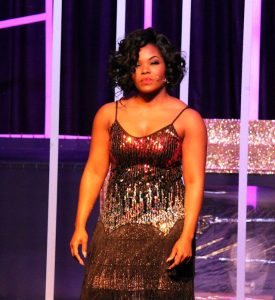 On stage for just one more weekend – that’s just 5 more performances – is Chicago, the story of rival vaudevillian murderesses Roxie Hart and Velma Kelly. Lisa Kuchinski sizzles as Roxie. Angela Pierre fumes in the role of Velma.
On stage for just one more weekend – that’s just 5 more performances – is Chicago, the story of rival vaudevillian murderesses Roxie Hart and Velma Kelly. Lisa Kuchinski sizzles as Roxie. Angela Pierre fumes in the role of Velma.
Whereas the character of Roxie Hart becomes more entrenched in her diabolically manipulative ways, Velma Kelly traverses a sharply circumscribed character arc over the course of the play. When we first meet the performer, she’s a supremely confident and self-sufficient diva who exudes attitude with a capital A. We quickly learn  during the provocative Cell Block Tango that Velma used to perform a dance routine with her sister until she caught Sis practicing Move No. 17 (The Spread Eagle) with her husband and killed them both. Pop, six, squish, uh-uh, Cicero, Lipschitz.
during the provocative Cell Block Tango that Velma used to perform a dance routine with her sister until she caught Sis practicing Move No. 17 (The Spread Eagle) with her husband and killed them both. Pop, six, squish, uh-uh, Cicero, Lipschitz.
Not to worry, she tells the club owner moments after washing the  blood from her hands. “I can do it alone,” she steadfastly maintains, extemporaneously transforming her duo into a solo act. Pop, six, squish, uh-uh, Cicero, Lipschitz.
blood from her hands. “I can do it alone,” she steadfastly maintains, extemporaneously transforming her duo into a solo act. Pop, six, squish, uh-uh, Cicero, Lipschitz.
But in the Cook County hoosegow, Velma discovers to her disgust and chagrin that she must depend on others for everything,  from having her bed made and her laundry cleaned to her fame as Chicago’s most celebrated double murderess and her ability to skate on the charges that the State has filed against her.
from having her bed made and her laundry cleaned to her fame as Chicago’s most celebrated double murderess and her ability to skate on the charges that the State has filed against her.
Velma is not accustomed to being dependent on anyone, and she doesn’t like the feeling one iota.
Sure, she manages to forge a working relationship with Mama, the matron of Cell Block 6 (played to the hilt 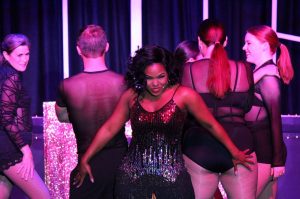 by Lacey Blissard), and with her slippery headline-chasing lawyer, Billy Flynn (played by the dashing A.J. Ford). But she draws the line at the fawning blond sycophant who arrives on the scene. Velma is the cantor. She doesn’t share the spotlight with anyone – especially a lowly cabaret wannabe.
by Lacey Blissard), and with her slippery headline-chasing lawyer, Billy Flynn (played by the dashing A.J. Ford). But she draws the line at the fawning blond sycophant who arrives on the scene. Velma is the cantor. She doesn’t share the spotlight with anyone – especially a lowly cabaret wannabe.
And it’s here where things get interesting and the girls’ relationship  takes a strange twist. Velma’s highhanded dismissal of Roxie proves to be an epic underestimation. (Or to quote Vivian in Pretty Woman) Big mistake. Big. HUGE!)
takes a strange twist. Velma’s highhanded dismissal of Roxie proves to be an epic underestimation. (Or to quote Vivian in Pretty Woman) Big mistake. Big. HUGE!)
A master manipulator, Roxie not only steals the limelight, she outwits Velma at every turn.
No longer the public’s darling, Velma has no choice but  to beg Roxie to partner up with her on stage after they’re both acquitted. Viewed from afar (as Master of Ceremonies Scott Davis encourages the audience to do), the abrupt about face can be viewed as an act of desperation bordering on degradation. But that view fails to properly appreciate what truly makes Velma tick.
to beg Roxie to partner up with her on stage after they’re both acquitted. Viewed from afar (as Master of Ceremonies Scott Davis encourages the audience to do), the abrupt about face can be viewed as an act of desperation bordering on degradation. But that view fails to properly appreciate what truly makes Velma tick. 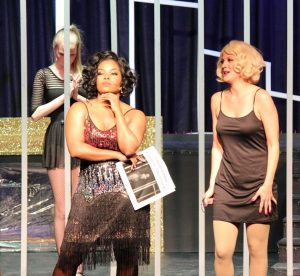 It can be summed up in one two-syllable word. Seven little letters made famous in 1967 by the Queen of Soul, Aretha Franklin. R-E-S-P-E-C-T.
It can be summed up in one two-syllable word. Seven little letters made famous in 1967 by the Queen of Soul, Aretha Franklin. R-E-S-P-E-C-T.
Respect is a two-edged sword. It can’t simply be given. It must first be earned. When Roxie initially asked for Velma’s help and advice, she hadn’t done anything to earn Velma’s respect. But everything Roxie does thereafter, not only wins Velma’s begrudging admiration, but her respect as well.
At this point, of course, the girls’ bargaining 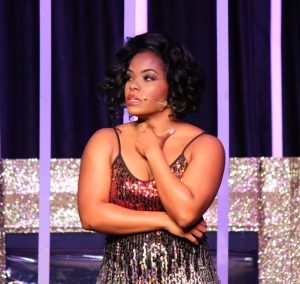 positions have shifted. Roxie is no longer the wide-eyed supplicant. She now holds all the cards. Demonstrating that turnabout is fair play, Roxie doesn’t just rebuff Velma’s overtures, she puts Velma in her place.
positions have shifted. Roxie is no longer the wide-eyed supplicant. She now holds all the cards. Demonstrating that turnabout is fair play, Roxie doesn’t just rebuff Velma’s overtures, she puts Velma in her place.
“I’m the big star,” Roxie admonishes Velma. “Single. Oh, I almost forgot. You were in the paper today too. In the back. With the obituaries. Velma Kelly’s trial has been postponed indefinitely. Ohhhh. Seven words. Wow.”
The last persons 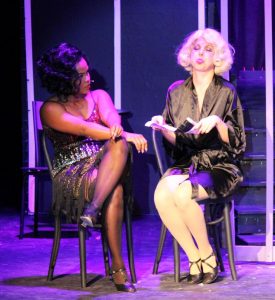 who disrespected Velma (her sister and husband) ended up dead. And from the proscenium, Roxie’s words may seem rife with disrespect. But not from Velma’s point of view. Velma would have lost respect for Roxie had she jumped at Velma’s offer to partner up after they both get out of jail. Roxie is no longer content to play second fiddle to Velma, and that’s something else that warrants Velma’s respect.
who disrespected Velma (her sister and husband) ended up dead. And from the proscenium, Roxie’s words may seem rife with disrespect. But not from Velma’s point of view. Velma would have lost respect for Roxie had she jumped at Velma’s offer to partner up after they both get out of jail. Roxie is no longer content to play second fiddle to Velma, and that’s something else that warrants Velma’s respect.
Velma is a talent. She sings. She dances. She’s achieved a quantum of pre-murder celebrity that commands the respect of Mama, the other girls on the cell block and the general public. But these are superficial 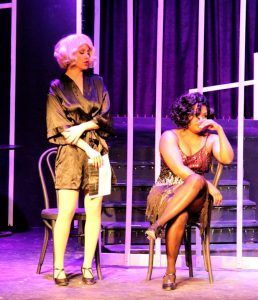 attributes and accomplishments. Only one person recognizes Velma’s intelligence and sophistication. And that person is Roxie Hart.
attributes and accomplishments. Only one person recognizes Velma’s intelligence and sophistication. And that person is Roxie Hart.
She proves it in a rather unconventional way – by appropriating Velma’s defense strategy to win her own acquittal. In so doing, she actually pays homage – from Velma’s perspective – to Velma’s intellect, craftiness and savvy, especially when it comes to sizing up the public’s capacity for forgiving duplicity and even murder because of their adoration of celebrity and fame.
It is this 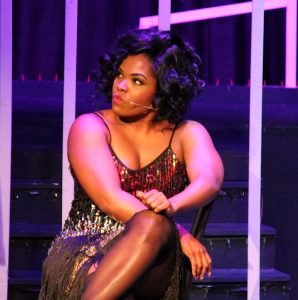 realization that makes the final scene in Chicago both understandable and eminently satisfying. Roxie hasn’t been merely substituted into Velma’s old act. They have a new act in which they are co-equals. Roxie and Velma. Velma and Roxie. It’s not that neither can do it alone, but rather that together, as equal partners, the sum is greater than the parts.
realization that makes the final scene in Chicago both understandable and eminently satisfying. Roxie hasn’t been merely substituted into Velma’s old act. They have a new act in which they are co-equals. Roxie and Velma. Velma and Roxie. It’s not that neither can do it alone, but rather that together, as equal partners, the sum is greater than the parts.
And it’s with that realization that Velma completes the character arc on which she embarked at the beginning of the play.
Angela Pierre 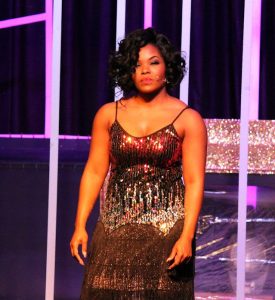 (with an immense shout out to Director Gerrie Benzing) is to be complimented for not only understanding what makes her character tick, but for her uncanny ability to convey that dimension to the audience. Since a playwright’s words are fixed and immutable, it is only by bearing, demeanor, inflection, tone and delivery that an actor or director can convey the meaning and interpretation they mine from the four corners of a script. And in this regard, Pierre and Benzing have struck gold!
(with an immense shout out to Director Gerrie Benzing) is to be complimented for not only understanding what makes her character tick, but for her uncanny ability to convey that dimension to the audience. Since a playwright’s words are fixed and immutable, it is only by bearing, demeanor, inflection, tone and delivery that an actor or director can convey the meaning and interpretation they mine from the four corners of a script. And in this regard, Pierre and Benzing have struck gold!
While character interpretation certainly adds dimension and import to 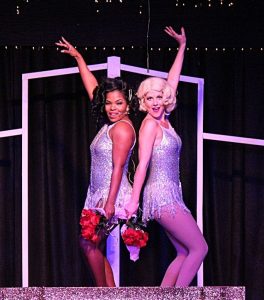 any production, Chicago is, in the final analysis, a musical. And on top of her acting ability, Pierre is a tremendous singer and dancer. She rocks the theater in both departments from the outset, setting the pace with All That Jazz and her snarling, seething rendition of Cell Block Tango, which is one of many highlights of the show. But it’s in numbers like Class (a duet with Lacey Blissard’s Mama) and Hot Honey Rag that her soulful jazz background really comes to the fore.
any production, Chicago is, in the final analysis, a musical. And on top of her acting ability, Pierre is a tremendous singer and dancer. She rocks the theater in both departments from the outset, setting the pace with All That Jazz and her snarling, seething rendition of Cell Block Tango, which is one of many highlights of the show. But it’s in numbers like Class (a duet with Lacey Blissard’s Mama) and Hot Honey Rag that her soulful jazz background really comes to the fore.
So pay your respects to Angela Pierre, Gerrie Benzing and their hip hop take on the character of Velma Kelly. Just two syllables. Seven letters. R-E-S-P-E-C-T.
March 6, 2019.














 Tom Hall is both an amateur artist and aspiring novelist who writes art quest thrillers. He is in the final stages of completing his debut novel titled "Art Detective," a story that fictionalizes the discovery of the fabled billion-dollar Impressionist collection of Parisian art dealer Josse Bernheim-Jeune, thought by many to have perished during World War II when the collection's hiding place, Castle de Rastignac in southern France, was destroyed by the Wehrmacht in reprisal for attacks made by members of the Resistance operating in the area. A former tax attorney, Tom holds a bachelor's degree as well as both a juris doctorate and masters of laws in taxation from the University of Florida. Tom lives in Estero, Florida with his fiancee, Connie, and their four cats.
Tom Hall is both an amateur artist and aspiring novelist who writes art quest thrillers. He is in the final stages of completing his debut novel titled "Art Detective," a story that fictionalizes the discovery of the fabled billion-dollar Impressionist collection of Parisian art dealer Josse Bernheim-Jeune, thought by many to have perished during World War II when the collection's hiding place, Castle de Rastignac in southern France, was destroyed by the Wehrmacht in reprisal for attacks made by members of the Resistance operating in the area. A former tax attorney, Tom holds a bachelor's degree as well as both a juris doctorate and masters of laws in taxation from the University of Florida. Tom lives in Estero, Florida with his fiancee, Connie, and their four cats.